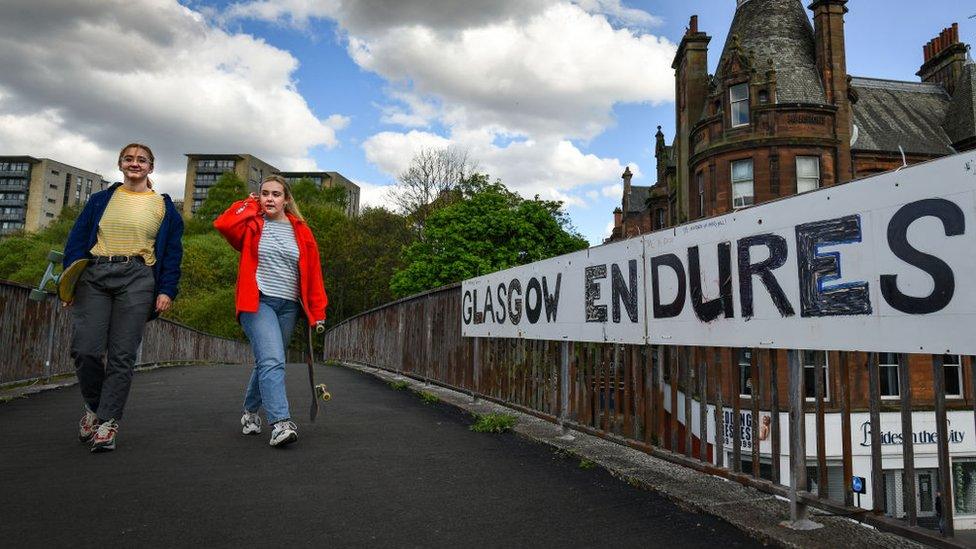Coronavirus: 'Building back better'
- Published

What are the positives that could come out of the economic crisis? How can the economy be re-booted and re-set to meet objectives other than further growth?
Wellbeing and localism are among the answers - although attractive and more social than economic, they come with risks and trade-offs.
I was chatting to a young neighbour, at an appropriate distance. She's a bar worker, and furloughed.
She'd been cycling, and we talked about quieter roads. I commented that It would be good if some aspects of lockdown are retained.
We talked more about how other things might change. "Power to the people," she said, with a look that added the silent Glaswegian words "aye, that'll be right".
It set me thinking. What does that mean? Power to which people, and how? It's no surprise that people feel they lack control of their lives, and are dissatisfied with the way "the system" works.
As the OECD rich nations' club noted on the trajectory into the Covid-19 crisis, there were already three 'P' trends; polarisation of opinion and increased tribalism, populism exploiting division, and growing pessimism, evidenced by the growing expectation of an older generation that their children will be worse off.
These trends could all be exacerbated by what we're going through. Or... not? A lot depends on the kind of economy that comes out of the health crisis. It could be one that's all about debt and unemployment, with responses aimed at using established economic policy to tackle them? Or an economy that's been re-booted and re-set, that aims, to borrow a hashtag, to "build back better".
So having thought a bit, I put together a special report that's been broadcast on Sunday on Good Morning Scotland. You can hear it again here.
Shorter week
It looks at the shift from a focus on economic growth to an economy based on the notion of wellbeing. That includes financial health and mixes it with the physical and mental variety, the quality of life, of relationships, access to green spaces and sense of security.
It's an attractive idea, no doubt. And the implications are radical and wide-ranging.
They extend to the type of work we do, and how much of it we do, moving into an era where there will not only be a surge in unemployment due to the lockdown, but one in which automation will replace many once-secure occupations.
In both New Zealand and Scotland, political leaders in recent days have floated the idea of a move to a standard four-day week. Nicola Sturgeon did not add the word "temporarily". This could be a fundamental shift, raising the question of whether people would compensate with higher productivity, or if they would accept lower incomes.
(Jeremy Corbyn and Labour also floated the idea in the winter election campaign, but without any explanation of how it would work, it succeeded only in making the party look ill-prepared.)

A shift to the goal of wellbeing, which also has the backing of the Scottish government - albeit in a cautious way for now - raises question about how we handle a potential fall in income, and a wide-ranging redistribution. That's not only from the wealthy, among whom there's a risk they'll take their wealth and tax base elsewhere, but between regions, and from one sector to another.
Out of poverty
There are options to become more local. My report looks at the example of North Ayrshire, where the council has brought together local people in Scotland's first "community wealth" initiative. It's been tried in North America and Preston, Lancashire, in trying to take the resource of people, land and public spending, to ensure the benefits remain with local people.
In that the old economy has been driven towards ever more efficient procurement of services and a reliance on inward investment into areas such as North Ayrshire, that carries risks - both of having less efficient services, and of spurning global opportunities in favour of a bootstraps philosophy of self-reliance.
I didn't have time to address all these issues, but it's worth saying the attractions of this kind of thinking could easily stray into more chauvinistic repudiation of trade systems. That's the way President Trump is taking the USA, and Narendra Modi is turning India in on itself.
To repudiate the economy as it has grown up is to reject something that has delivered material wellbeing for us, in developed nations, and a huge growth in (conventional) prosperity for others.
I'm talking here about the people whose jobs have been built on selling goods and services around the world. It may be good that we're not continuing to spend during lockdown on cheap, disposable fashion, but there are many millions of garment workers, in Bangladesh for instance, who are out of work as a result.

RISK AT WORK: How exposed is your job?
GLOBAL SPREAD: Tracking the pandemic
RECOVERY: How long does it take to get better?
A SIMPLE GUIDE: What are the symptoms?

Social cohesion
We may want to shorten supply chains in manufacturing and services, to rely less on Asia, since finding how vulnerable these links are to disruption. But literally billions of people have been brought out of poverty by the globalised economy that's been suddenly stopped, and that may now be thrown into reverse.
You could argue these workers, in Chinese factories, Bangladeshi sweatshops and Indian call centres have been the exploited pawns of global corporations, the profits feeding the wealth of the top 1%.
You could be right. But as crisis is an opportunity for rebooting and resetting the economy, I'm simply suggesting that we should be careful what we wish for.
The opportunity that comes with crisis is risky. Much will surely change, but in my radio report, Matthew Taylor, director of the Royal Society of Arts, says crisis can lead to bad or good outcomes.
World War One was concluded on terms that fed the conditions for the Great Depression and World War Two. That second global conflict began a period of relative peace, prosperity and social cohesion.
The HIV/AIDS crisis led to a much stronger gay community, as well as life-saving clinical treatments. By contrast, the hopes of a better, fairer, less financialised economy coming out of the 2008 financial crash haven't come to much.
Each of these involved choices. It is, as Matthew Taylor concludes, up to us.
